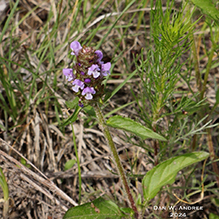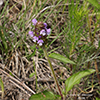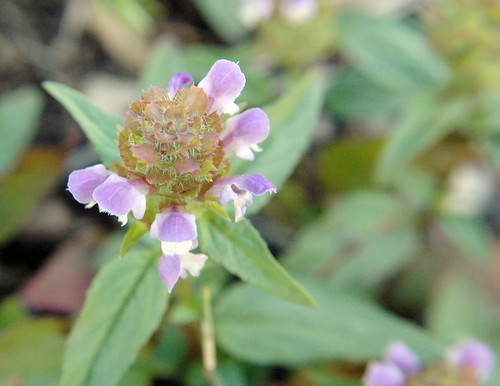lance selfheal
(Prunella vulgaris ssp. lanceolata)
Conservation • Wetland • Description • Habitat • Ecology • Use • Distribution • Taxonomy
Description |
Lance selfheal is a 4″ to 20″ tall, perennial forb that rises on one or more stems from fibrous roots. The stems can be drooping, almost laying flat on the ground, to almost erect. They are unbranched, 4-angled, and winged. The leaves are opposite, lance-shaped to oblong lance-shaped, ⅝″ to 1½″ long, and ¼″ to ⅜″ wide. The middle stem leaves are ⅓ as wide as long. They are on ¼″ to 1″ long leaf stalks. The upper and lower surfaces are hairless or have sparse, long, soft, shaggy, unmatted hairs. The margins are untoothed. The inflorescence is an egg-shaped, ¾″ to 2″ long, and ⅝″ to ¾″ wide spike of many flowers at the end of the stem. The flowers are ⅜″ to ¾″ long. There are 5 petals fused at the base into a tube about ⅛″ long, then separated into an upper and lower lip. The upper lip is purple, almost round, hood-like, about 3 ⁄16″ in diameter, and notched at the tip. The lower lip is white and about half as long as the upper lip. It is divided into 3 lobes, a large central lobe and 2 smaller lateral lobes. The lateral lobes are about 1 ⁄16″ long and spreading. The central lobe is about ⅛″ long, strongly bent downward, and fringed at the tip. There are 4 stamens that are concealed under the hood. The fruit is a smooth brownish-yellow nutlet about 1 ⁄16″ long. |
Height |
4″ to 20″ |
Flower Color |
Purple to violet-blue |
Similar Species |
Common selfheal (Prunella vulgaris ssp. vulgaris) leaves tend to be a little longer and much wider. They are egg-shaped to oblong egg-shaped, up to 2⅜″ long, and up to 1″ wide. The middle stem leaves are ½ as wide as long. The upper surface is almost hairless or is covered with very small, coarse, stiff hairs. The lower surface is almost hairless. The margins are wavy. |
Habitat |
Disturbed sites. |
Ecology |
Flowering |
June to October |
Pests and Diseases |
|
Use |
|
Distribution |
||
|
Sources |
|
| 6/23/2024 | ||
Nativity |
||
Native |
||
Occurrence |
||
|
||
Taxonomy |
|
Kingdom |
|
Subkingdom |
Pteridobiotina |
Phylum |
Tracheophyta (Vascular Plants) |
Class |
|
Order |
Lamiales (Mints, Plantains, Olives, and Allies) |
Family |
Lamiaceae (Mint) |
Subfamily |
Nepetoideae |
Tribe |
Mentheae |
Subtribe |
Prunellinae (cleonias, dragonmouths, and selfheals) |
Genus |
Prunella (selfheals) |
Species |
|
Subordinate Taxa |
|
|
|
Synonyms |
|
Prunella vulgaris var. elongata Prunella vulgaris var. lanceolata |
|
Common Names |
|
common all-heal common self-heal heal-all healall lance selfheal lance self-heal lawn prunella self-heal selfheal |
|
Glossary
Wing
A thin, flat, membranous, usually transparent appendage on the margin of a structure.
Visitor Photos |
||
Share your photo of this plant. |
||
This button not working for you? |
||
Dan W. Andree |
||
 |
|
|
Plant with small purple flower clusters... I seen a few of these recently only in one certain small area at Frenchman’s Bluff SNA. All were short plants maybe 5-8 inches tall. |
|
|
MinnesotaSeasons.com Photos |
||
|
||
|

Visitor Videos |
||
Share your video of this plant. |
||
This button not working for you? |
||
|
Other Videos |
||
|

Visitor Sightings |
||
Report a sighting of this plant. |
||
This button not working for you? |
||
| Dan W. Andree June 2024 |
Location: Frenchman’s Bluff SNA I seen a few of these recently only in one certain small area at Frenchman’s Bluff SNA. All were short plants maybe 5-8 inches tall. |
 |
MinnesotaSeasons.com Sightings |
||

|
Created: Last Updated: © MinnesotaSeasons.com. All rights reserved. |


